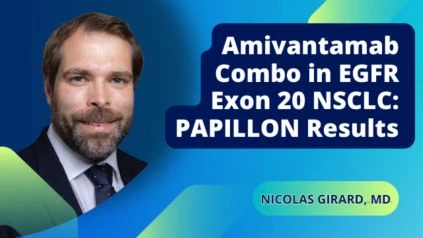By. Nicolas Rigard, MD
Date. 11/20/2023
In this interview, Nicolas Girard, MD, a medical doctor and professor of respiratory medicine at Versailles, St. Quentin University, and the head of the Curie-Montsouris Thorax Institute, discusses the PAPILLON study. The interview, conducted by Alan from OncologyTube, explores the comparison between Amivantamab plus chemotherapy and chemotherapy alone as the first-line treatment for EGFR Exon 20 insertion-mutated advanced non-small cell lung cancer.
Nicolas Girard, MD, provides an overview of the study’s primary endpoint, progression-free survival (PFS), emphasizing the reduction in the risk of disease progression and the extension of median PFS with the Amivantamab plus chemotherapy combination. Nicolas Girard, MD, highlights the clinical benefits observed in terms of long-term efficacy, as reflected in PFS2 data and overall survival data.
The discussion touches upon the implications of these PFS results for the treatment landscape of patients with EGFR Exon 20 insertion-mutated advanced non-small cell lung cancer. Nicolas Girard, MD, underscores the role of Amivantamab plus chemotherapy as a new standard of care, supported by the absence of comparable clinical data with other treatments.
The interview further explores the strategic considerations in the treatment approach, comparing the combination upfront with a sequential approach of chemotherapy followed by Amivantamab. Nicolas Girard, MD, emphasizes the benefits of initiating the combination upfront based on PFS2 data and interim overall survival data.
The safety and tolerability of Amivantamab combined with chemotherapy are addressed, with Nicolas Girard, MD, providing an assessment of manageable side effects, including hematological and digestive issues. Nicolas Girard, MD, emphasizes the importance of proactive management and early identification of side effects.
The option for patients in the chemotherapy arm to crossover to Amivantamab monotherapy upon progression is discussed in the context of real-world clinical practice. Nicolas Girard, MD, points out that, in the current landscape, many patients are already receiving targeted agents against Exon 20 in the second-line setting, making the study’s crossover design relevant to the ongoing treatment strategies for these patients.
In conclusion, Nicolas Girard, MD’s expertise and insights in this interview contribute to understanding the findings of the PAPILLON study and the potential impact on the standard of care for patients with EGFR Exon 20 insertion-mutated advanced non-small cell lung cancer.

